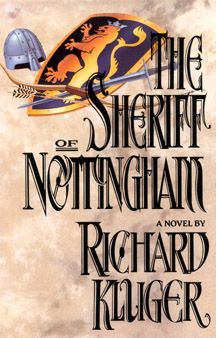
Philip had always viewed the woodsman as an endearing lout who, for all his antic spirit, possessed a soul of honor; now he was exposed as capable of as much treachery as the craftiest of courtiers. "This is a spiteful rogue, gentlemen, who feeds on sour grapes."
--Richard Kluger, The Sheriff of Nottingham, p.447
This is not a novel about the Robin Hood legend. Instead it is an interesting, well-written historical novel about a real man, Philip Mark. He started his career as a common soldier. But for over a decade, Philip Mark held the title of what's become the world's most infamous public official. Philip was the sheriff of Nottinghamshire and Derbyshire.
Cambridge historian Sir James C. Holt who has written both on King John's reign and the Robin Hood legend had this to say about the real Philip Mark.
Philip's conduct of his shrievalty included robbery, false arrest, unjust disseisin, and persistent attacks on local landed interests, both secular and ecclesiastical...
He was as zealous, thrustful, and dangerous under Henry [III, John's son] as he was under John. For 15 years on to 1224, when he finally lost his shrievalty, he envenomed the local politics of Nottinghamshire and Derbyshire.
-- J.C. Holt, The Northerners, p. 230.

The real Philip Mark was mentioned by name in the document that would become the Magna Carta.
But Kluger's Philip is not the same as Holt's. Kluger writes Philip as a very moral man who is forced to make difficult choices. He is a good man doing a tough job. Philip dismisses the charges against him as "the classic whines of the reluctant taxpayer."
Those around Philip are the ones at fault. For example, the sheriff's trusted servant Sparks embezzles money to provide a nice retirement fund for his master. And Philip Mark's wife, Anne, has an affair.
Then there's that ne'er-do-well rogue of Sherwood Forest who puts in a few (and only a few) appearances.
And what is Philip Mark's failing? Being too good for his own good. I find that Philip isn't a very complex man. But then that does make an interest contrast with the problems around him. The moral of the story seems to be "No good deed goes unpunished."
I enjoyed the use of real history in the book, such as King John's order to hang some Welsh children at Nottingham. The novel blends fiction and fact in an enjoyable way.
If you're looking for a fast-paced or funny book, look elsewhere. But if you'd like something a little different than most Robin Hood stories, something that looks at the politics of the early 13th century and the people of those times, The Sheriff of Nottingham is worth reading.
Another Philip Mark: A monstrously evil version of Philip Mark can be seen in the Robin of Sherwood episode "The Sheriff of Nottingham". He shares the same name and title as Kluger's Philip, but they have little else in common.
The Good Sheriff: The conception of a good -- or at least less bad -- sheriff has been explored many times. There's the complicated sheriff in Michael Cadnum's novel In a Dark Wood. What eventually became the 2010 Robin Hood movie starring Russell Crowe began as Nottingham, a script where the sheriff was the hero, by Ethan Reiff and Cyrus Voris. The likeable Phillip de Nicolay is the Sheriff of Nottingham at the centre of the Hood audio drama series by Iain Meadows. And Nathan Makaryk offers up multiple good sheriffs in his 2019 novel Nottingham.
A famous name: I borrowed this book from the very appropriately named Runnymede branch of the Toronto Public Library. Runnymede is also the name of the place where the Magna Carta was signed.
Buy The Sheriff of Nottingham by Richard Kluger on Amazon.com
Buy The Sheriff of Nottingham by Richard Kluger on Amazon.co.uk
Buy The Sheriff of Nottingham by Richard Kluger on Amazon.ca
Contact Us